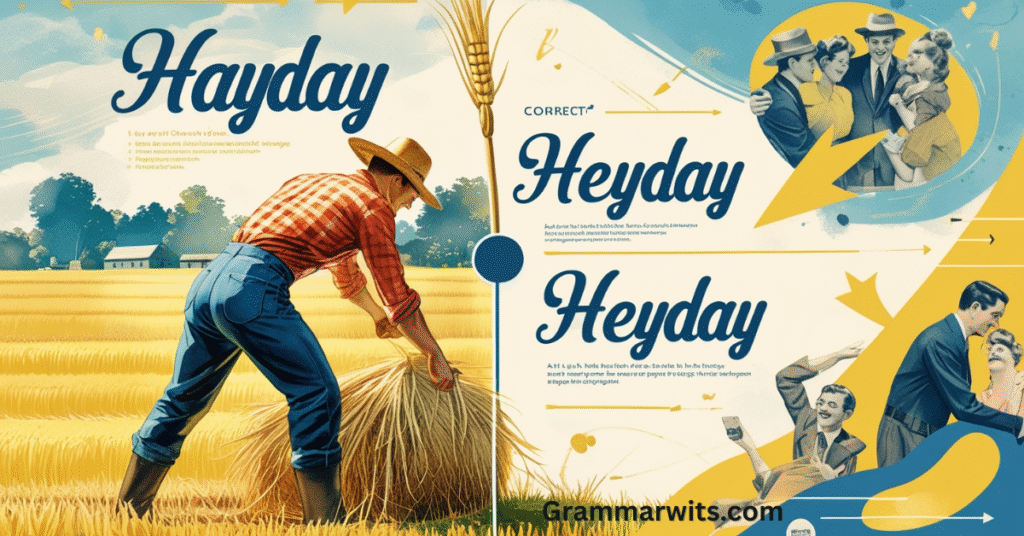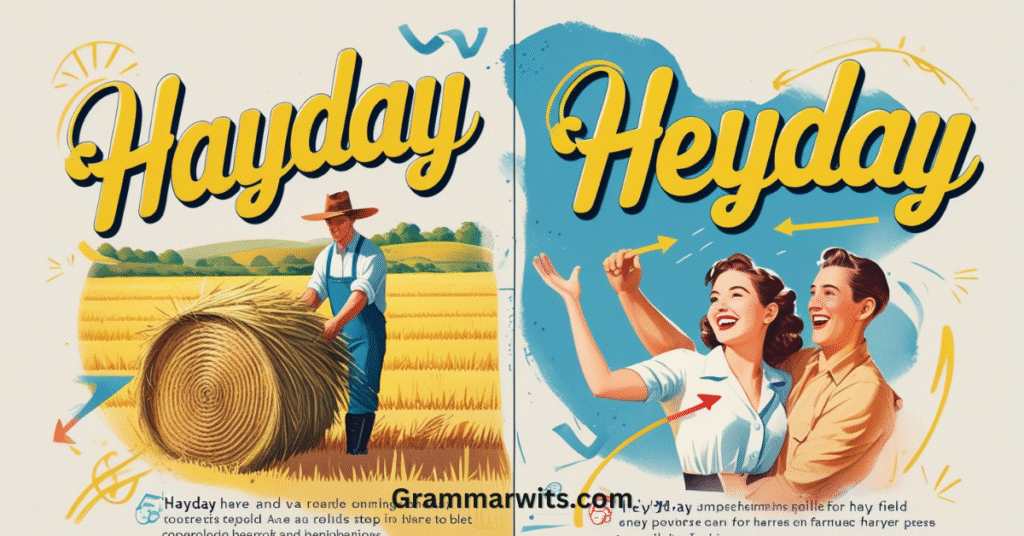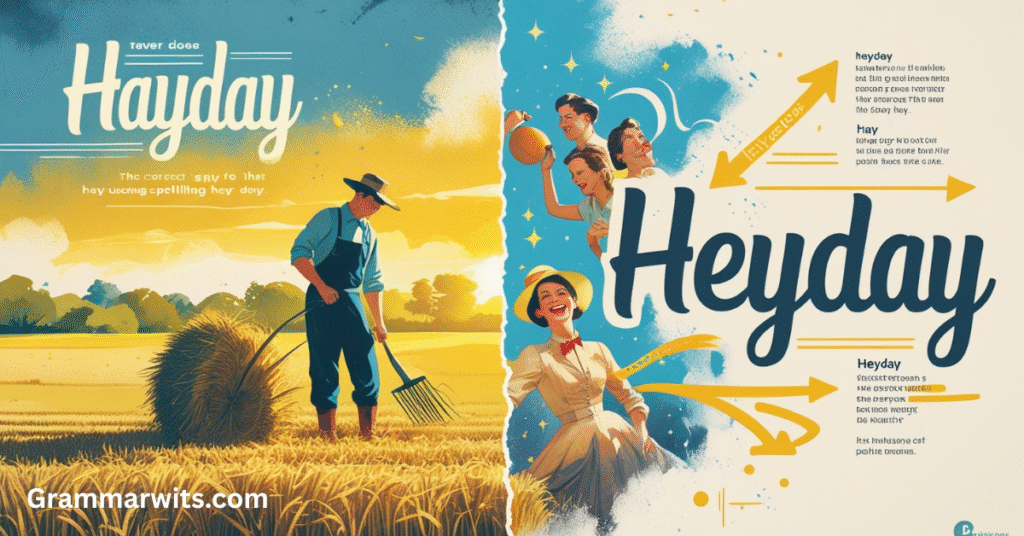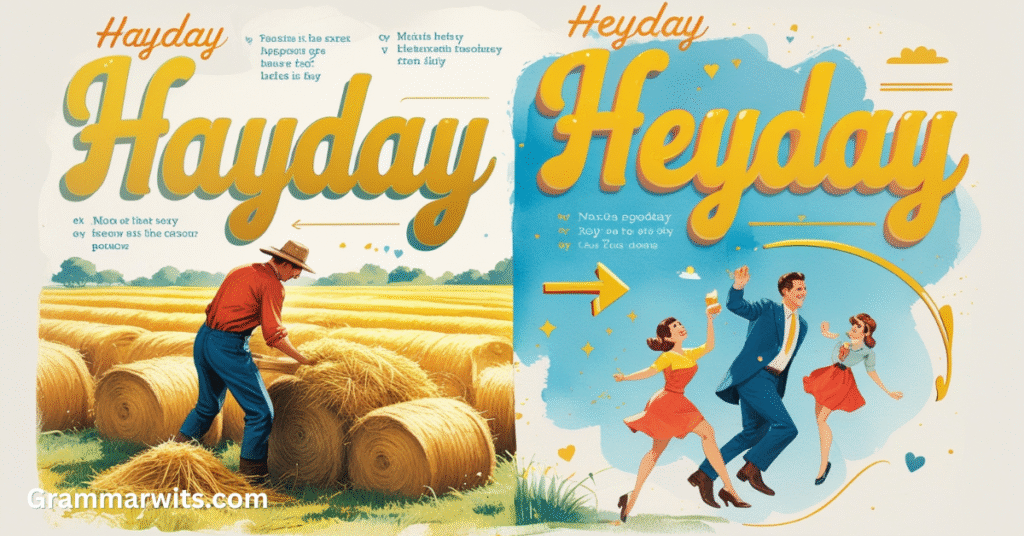In everyday English, the phrase “heyday or hayday” often surfaces when describing a peak period of success, strength, or popularity. While the two terms may sound identical, only “heyday” is the correct and recognized word. It refers to a time of greatest vigor or influence—when someone or something is at the top of their game. On the other hand, “hayday” is a common misspelling that carries no official meaning, despite how visually convincing it might seem.
Language is full of subtle traps, and one misstep can derail clarity. Mixing up “heyday” and “hayday” is one of those deceptively simple mistakes that can make even polished writing appear careless. Understanding the difference not only sharpens your grammar game but also elevates your communication. If you’re someone who appreciates the power of words and precision in language, mastering nuances like this is non-negotiable.
The rise in this confusion stems from the way the words sound—identical in pronunciation but entirely different in origin and meaning. “Heyday” comes from a cheerful exclamation in Middle English that evolved into a term for peak times. Whether you’re writing about a celebrity’s career peak or reminiscing about a golden era, knowing the correct usage of “heyday” ensures your message hits the mark with accuracy and style.
The Brutal Truth: Why “Hayday” Doesn’t Exist
Hayday represents one of English’s most persistent spelling variants – and it’s completely wrong. Major dictionaries including Merriam-Webster, Oxford, and Cambridge don’t recognize “hayday” as a legitimate word. Zero exceptions exist.
The semantic confusion surrounding heyday or hayday stems from phonetic similarity rather than actual linguistic validity. When people hear the word spoken, they often connect it mentally to “hay” – the dried grass farmers use for animal feed.
| Source | “Heyday” Listed | “Hayday” Listed |
|---|---|---|
| Merriam-Webster | ✅ Yes | ❌ No |
| Oxford Dictionary | ✅ Yes | ❌ No |
| Cambridge Dictionary | ✅ Yes | ❌ No |
| Collins Dictionary | ✅ Yes | ❌ No |
Google Trends data reveals fascinating insights about this commonly confused words pair. Searches for “hayday” spike during back-to-school seasons and business quarter endings – precisely when people need correct word usage most desperately.
Professional style guides treat “hayday” as an automatic red flag. The Associated Press Stylebook, Chicago Manual of Style, and MLA guidelines all classify it as a misspelling. Your credibility takes an immediate hit when editors spot this error.
“Heyday” Decoded: Meaning and Proper Usage
Heyday functions exclusively as a noun describing someone’s peak period of success, popularity, or vigor. Think of it as the golden age when everything clicks perfectly – careers soar, creativity flows, and achievements multiply.
The word captures those magical moments when individuals, companies, or entire industries operate at their absolute pinnacle. Hollywood’s heyday during the 1940s produced legendary films that still influence cinema today. Apple’s heyday under Steve Jobs transformed technology forever.
Pronunciation matters tremendously. Say “HEY-day” (rhyming with “play day”), never “HAY-day.” The emphasis falls squarely on the first syllable, creating an upbeat, celebratory sound that matches the word’s joyful etymology.
Core Definitions:
- Primary meaning: The period of greatest success or popularity
- Secondary meaning: Time of maximum vigor and energy
- Contextual usage: Peak performance phase in any domain
- Emotional connotation: Positive, celebratory, triumphant
Heyday never transforms into other parts of speech. You can’t “heyday” something (verb) or describe something as “heyday-ish” (adjective). The word maintains its noun identity across all contexts.
Memory Tricks That Actually Work

Conquering the heyday or hayday dilemma requires reliable memory techniques. These proven strategies eliminate guesswork permanently:
The “Hey” Connection works brilliantly because “hey” expresses excitement and celebration. When you reach your heyday, people literally say “Hey, look at their amazing success!” The exclamation origin makes perfect sense.
Visual Memory Technique: Picture someone shouting “HEY!” during their peak success. Olympic athletes often raise their arms and yell “HEY!” after winning gold medals – their career heyday moment captured forever.
Etymology Anchoring provides the strongest foundation. Heyday derives from Middle English “heyda,” an interjection expressing joy and excitement. Nothing connects to hay, farming, or agriculture. The Germanic roots trace back to celebratory exclamations, not crop production.
Quick Memory Devices:
- “Hey, it’s my heyday!” – Links pronunciation to meaning
- “HEY = High Energy Years” – Acronym for peak periods
- “Celebration = HEY-day” – Emotional connection to success
- “No hay in heyday” – Eliminates agricultural confusion
Contextual anchoring works exceptionally well for visual learners. Create mental images of people celebrating their high point in time by shouting “HEY!” enthusiastically. This technique embeds correct spelling through emotional association.
Real-World Usage Examples
Business contexts showcase heyday most powerfully. Companies experience distinct phases where everything aligns perfectly – market conditions, leadership, innovation, and execution converge into extraordinary peak performance.
Corporate Success Stories:
- “Netflix’s heyday began when streaming replaced physical DVDs”
- “Google’s heyday coincided with the internet’s explosive growth”
- “Tesla’s heyday emerged during the electric vehicle revolution”
- “Microsoft’s heyday peaked during the personal computer boom”
Historical applications demonstrate the word’s versatility across different time periods. Heyday or hayday decisions become crystal clear when you see authentic examples from respected sources.
The Roman Empire’s heyday lasted several centuries, encompassing territorial expansion, architectural marvels, and cultural achievements that influence civilization today. Renaissance Italy’s heyday produced Leonardo da Vinci, Michelangelo, and artistic innovations that define Western culture.
Entertainment Industry Examples:
- “Elvis Presley’s heyday transformed popular music forever”
- “Broadway’s heyday during the 1940s created timeless musicals”
- “Rock music’s heyday peaked in the 1970s with legendary bands”
- “Hollywood’s golden heyday produced cinema’s greatest classics”
Personal contexts make the word relatable to individual experiences. Athletes discuss their career peak, artists reference their most successful time, and professionals identify their prime years of achievement and recognition.
Power Synonyms and Alternatives

Expanding vocabulary beyond heyday requires understanding subtle differences between similar terms. Each alternative carries unique connotations that affect tone and precision.
Formal alternatives include zenith, pinnacle, apex, and acme. These terms work excellently in academic writing, professional reports, and sophisticated analyses where elevated language enhances credibility.
| Synonym | Formality Level | Best Context | Emotional Tone |
|---|---|---|---|
| Prime | Medium | Business, personal | Neutral |
| Pinnacle | High | Academic, formal | Elevated |
| Zenith | High | Scientific, literary | Sophisticated |
| Golden age | Medium | Historical, cultural | Nostalgic |
| Glory days | Low | Casual, conversational | Sentimental |
| Peak success | Medium | Professional, analytical | Achievement-focused |
Casual alternatives like glory days, golden age, and prime time work perfectly for conversational writing, blog posts, and informal presentations. They maintain approachability while conveying the same essential meaning.
Context-specific options serve specialized purposes. Renaissance implies cultural rebirth, boom period suggests economic growth, and flowering indicates creative or intellectual development. Choose alternatives that match your specific message.
Tone considerations determine optimal word selection. Heyday sounds celebratory and energetic. Zenith feels more analytical and detached. Glory days carries nostalgic warmth that pinnacle lacks entirely.
Etymology Deep Dive: Where “Heyday” Really Comes From
The word origins of heyday reveal fascinating linguistic evolution that explains why hayday never made sense historically. Etymology provides the ultimate proof for correct spelling.
Middle English “heyda” emerged during the 16th century as an exclamation expressing joy, wonder, or surprise. People shouted “heyda!” during moments of excitement – exactly when someone might experience their peak period of success.
Germanic roots trace back even further to expressions of jubilation and celebration. The interjection gradually transformed into a noun describing the time period when such celebrations were most warranted – someone’s high achievement phase.
Historical Timeline:
- 1520s: First recorded use as exclamation “heyda!”
- 1590s: Transition to noun meaning “peak period”
- 1600s: Standardized spelling as “heyday”
- 1700s: Widespread adoption in English literature
- Modern era: Established as standard English vocabulary
Agricultural misconceptions about “hay” connections demonstrate how semantic confusion develops. People associate familiar words with unfamiliar ones, creating false etymological links that persist despite lacking historical accuracy.
Linguistic curiosity emerges from this transformation pattern. Few English words evolved from joyful exclamations into nouns describing success periods. This unique word formation process makes heyday linguistically special.
Historical linguistics reveals that exclamation-to-noun evolution occurred with several English words during the same period. “Heyday” represents one successful example of this language evolution pattern that enriched English vocabulary permanently.
Common Mistakes Beyond the Spelling

Heyday or hayday represents just the beginning of usage errors surrounding this versatile word. Multiple misused words patterns affect even experienced writers who nail the spelling correctly.
Pluralization errors create unnecessary confusion. “Heydays” technically works grammatically, but most contextual usage involves singular peak periods. Companies rarely experience multiple simultaneous heydays – they have one definitive golden age.
Verb misuse appears frequently in casual writing. “Heydaying” isn’t a legitimate word formation. You can’t “heyday your way to success” or “heyday through difficult times.” The word maintains strict noun classification across all contexts.
Common Error Patterns:
- Incorrect: “The company is heydaying right now”
- Correct: “The company is experiencing its heyday”
- Incorrect: “We heydayed during the 1990s”
- Correct: “Our heyday occurred during the 1990s”
Overuse warnings apply when writers discover this powerful word. Heyday loses impact through repetition within the same document. Vary your vocabulary improvement by incorporating appropriate synonyms strategically.
Context mismatches occur when writers apply heyday to inappropriate situations. Tragic events, declining periods, or neutral timeframes don’t qualify as heydays. The word carries inherently positive connotations about peak success and prominence.
Temporal confusion affects writers discussing ongoing success. Heyday implies a completed period that can be evaluated retrospectively. Current success might become someone’s future heyday, but it isn’t their heyday yet.
Professional Writing Standards
Corporate communications demand absolute precision with commonly confused words like heyday or hayday. Executive presentations, annual reports, and client proposals cannot afford spelling confusion that undermines professional credibility.
AP Stylebook guidance emphasizes consistency in word choice throughout publications. Once you establish heyday as your preferred term for peak periods, maintain that selection across all related content to ensure language accuracy.
Academic writing often favors more formal alternatives to heyday. Zenith, pinnacle, and apex carry scholarly gravitas that heyday sometimes lacks. Consider your audience’s expectations when selecting among synonyms for heyday.
Industry-Specific Preferences:
- Finance: “Peak performance period” or “optimal phase”
- Technology: “Innovation surge” or “breakthrough era”
- Entertainment: “Golden age” or “career pinnacle”
- Sports: “Prime years” or “championship era”
Digital content requires balancing SEO relevance with natural language tips. Heyday works excellently for search optimization while maintaining readability that engages human audiences effectively.
Editorial standards at major publications treat heyday or hayday decisions as fundamental writing clarity tests. Writers who consistently choose correctly demonstrate attention to detail that editors value highly.
Style consistency extends beyond individual articles to entire brand communications. Companies should establish usage guidelines for terms like heyday to ensure unified messaging across all channels and content types.
Quick Reference Guide

Mastering heyday or hayday requires easy access to essential facts during writing pressure moments. This condensed reference eliminates hesitation when deadlines approach.
Spelling certainty: Always “heyday” – never “hayday” under any circumstances. No exceptions exist in standard English dictionaries or style guides.
Pronunciation guide: HEY-day (rhymes with “play day”) with emphasis on the first syllable. This phonetic similarity to “hey” reinforces the correct spelling through sound association.
Part of speech: Exclusively noun – never verb, adjective, or adverb. Grammatical flexibility doesn’t apply to heyday despite its versatile meaning.
Essential Quick Facts:
- Definition: Peak period of success or popularity
- Etymology: Middle English exclamation “heyda”
- Pronunciation: /ˈheɪdeɪ/ (HEY-day)
- Synonyms: Prime, pinnacle, zenith, golden age
- Common error: Spelling as “hayday”
- Usage tip: Describes completed peak periods retrospectively
Memory reinforcement through regular practice embeds correct word usage permanently. Include heyday in your active vocabulary by identifying peak success examples from various fields and describing them accurately.
Proofreading checklist should always include scanning for heyday or hayday instances. This frequently misused term requires special attention during editing phases to maintain professional writing standards.
Final Verdict and Action Steps
Language accuracy in heyday or hayday decisions reflects broader writing clarity skills that impact career success. This seemingly small choice reveals attention to detail that distinguishes professional communicators from casual writers.
Bottom line certainty: “Heyday” remains the only correct spelling across all contexts, industries, and style guides. “Hayday” represents a persistent misspelling that undermines credibility instantly.
Confidence building comes from understanding the etymology and contextual usage patterns that make heyday such a powerful vocabulary tool. You now possess deeper knowledge than most professional writers about this commonly confused words pair.
Implementation Strategy:
- Practice identification: Find heyday examples in business news
- Active usage: Incorporate the word into your next presentation
- Error spotting: Notice “hayday” mistakes in others’ writing
- Knowledge sharing: Educate colleagues about correct spelling
- Confidence building: Use heyday naturally without hesitation
Next level mastery involves recognizing when synonyms might serve your message better than heyday. Word choice sophistication demonstrates advanced English language skills that enhance professional reputation.
Proofreading excellence requires systematic checking for heyday or hayday decisions in every important document. This attention to language tips separates exceptional writers from merely competent ones.
Your journey to vocabulary improvement continues beyond mastering this single word. Apply the same rigorous etymological research approach to other commonly confused words that challenge professional writers daily.
FAQ Section
Is “hayday” ever correct in any context?
Absolutely not. “Hayday” represents a misspelling in every situation across all English dialects. No style guides, dictionaries, or academic sources recognize “hayday” as legitimate. Heyday or hayday decisions always favor the “heyday” spelling without exceptions. Professional writing standards treat “hayday” as an automatic error that requires correction.
How do you pronounce “heyday” correctly?
Pronounce it “HEY-day” with strong emphasis on the first syllable, rhyming perfectly with “play day.” Never say “HAY-day” which contributes to spelling confusion. The phonetic similarity to the exclamation “hey!” reinforces correct word usage and helps remember the proper spelling. This pronunciation guide eliminates semantic confusion that leads to misspelling.
Can “heyday” be used as a verb or adjective?
No, heyday functions exclusively as a noun. You cannot “heyday” something or describe something as “heyday-like.” Word formation rules don’t permit heyday to transform into other parts of speech. Grammatical flexibility doesn’t apply here – the word maintains strict noun classification across all contextual usage patterns and writing clarity requirements.
What’s the difference between “heyday” and “golden age”?
Both terms describe peak success periods, but heyday typically implies shorter, more specific timeframes while golden age suggests longer eras of sustained excellence. Heyday carries more celebratory energy due to its exclamation origin, whereas golden age sounds more nostalgic and reflective. Choose based on your tone and contextual usage needs for optimal language accuracy.
Why do so many people spell it “hayday”?
Phonetic similarity between “heyday” and familiar words like “hay” creates semantic confusion. People connect the sound to agricultural terms they know rather than the actual etymology from Middle English exclamations. This commonly confused words pattern affects many frequently misused terms where sound association overrides historical linguistics and correct spelling knowledge.

Alizy Smith is a passionate language enthusiast and the admin of Grammar Wits. With a love for wordplay, grammar quirks, and witty expressions, she’s dedicated to making language learning fun and accessible. From grammar tips to pun-filled laughs, Alizy ensures every piece of content entertains while educating — turning tricky rules into easy, enjoyable reads.





